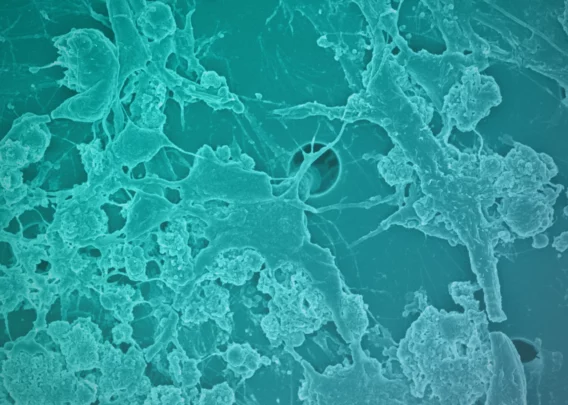Collaborative R&D to focus on innovation for patient-driven advances in cancer treatment
‘Human Emulation System’ offers a living platform to understand disease and design new cancer medicines
BOSTON, Mass., Oct. 20, 2016 – Emulate, Inc. announced today its strategic collaboration with the Lawrence J. Ellison Institute for Transformative Medicine of USC to use Emulate’s Organs-on-Chips technology to conduct leading-edge translational R&D that can advance cancer treatment and patient well-being. Emulate and the Ellison Institute will collaborate on innovative approaches for modeling the human physiology of cancer and predicting human response to treatments, expanding the functionality and applications of using the Organs-on-Chips technology in cancer research. This R&D initiative is announced as part of Emulate’s growing network of collaborators and is designed to foster translational research to expand the range of academic, commercial and clinical applications for Emulate’s Human Emulation System™.
Emulate’s Organs-on-Chips technology is a prime example of how we are applying the latest innovations and interdisciplinary research across biology, engineering and data sciences to transform the prevention and treatment of cancer.
— David B. Agus, M.D., CEO and founder of the Ellison Institute and professor at the Keck School of Medicine of USC and USC Viterbi School of Engineering.
“We are delighted to partner with the world-leading researchers at USC and the Ellison Institute to combine the expertise of our teams and develop new ways to apply our Human Emulation System to enable a broad range of breakthrough cancer research for patient wellness and care,” said Geraldine A. Hamilton, Ph.D., President and Chief Scientific Officer of Emulate. “In addition to our common goals of advancing scientific discovery and innovation, the Ellison Institute is also aligned with our mission to advance new understanding of human biology and disease. We look forward to working alongside of leading researchers at USC and the Ellison Institute to expand and accelerate the impact of our Organs-on-Chips technology for improving human health, particularly in the field of cancer.”
“Emulate’s Organs-on-Chips technology is a prime example of how we are applying the latest innovations and interdisciplinary research across biology, engineering and data sciences to transform the prevention and treatment of cancer,” said David B. Agus, M.D., CEO and founder of the Ellison Institute and professor at the Keck School of Medicine of USC and USC Viterbi School of Engineering.
Under the terms of the translational R&D collaboration, Emulate and the Ellison Institute will agree to work together on the development of specific organ and disease models that leverage the Ellison Institute’s expertise in cancer innovation, with the potential to lead to new Organ-Chip products to commercialize within Emulate’s Human Emulation System. In addition, the Ellison Institute will gain early access to Emulate’s lab-ready product platform – including new automated instrumentation, Organ-Chips and software applications – for novel research programs within its own laboratories. Emulate’s proprietary technology recreates the natural physiology of living human biology, and is designed to predict human responses to diseases, medicines and chemicals with greater precision than existing cell culture or animal testing experimental methods.
“The human-relevant model systems offered by Organs-on-Chips technology are ideally suited to evolve the way we understand the complexities of cancer biology,” said Shannon M. Mumenthaler, Ph.D., Assistant Professor of Research Medicine at the Keck School of Medicine of USC and the Director for the Stephenson Family Personalized Medicine Center at the Ellison Institute. “Our research team is excited to collaborate with Emulate’s scientists and use their Human Emulation System as a platform to help design more effective cancer treatments for improving patient health and wellness.”
About the ‘Human Emulation System’ Powered by Organs-on-Chips Technology
Based on the Organs-on-Chips technology, Emulate has created a new living Human Emulation System™ that provides a real-time window into the inner workings of human biology and disease — offering researchers a new technology designed to predict human response with greater precision and detail than today’s cell culture or animal-based testing. Each of Emulate’s proprietary Organ-Chips — such as the lung, liver, brain or kidney — contains tiny hollow channels lined with tens of thousands of living human cells and tissues, and is approximately the size of an AA battery. An Organ-Chip is a living, micro-engineered environment that recreates the natural physiology and mechanical forces that cells experience within the human body.
About Emulate, Inc.
Emulate Inc. is a privately held company that creates living products for understanding how diseases, medicines, chemicals, and foods affect human health. Our Human Emulation System™ sets a new standard for recreating true-to-life human biology and is being used to advance product innovation, design, and safety across a range of applications including drug development, agriculture, cosmetics, food, and chemical-based consumer products. Emulate continues to develop a wide range of Organ-Chips and disease models through collaborations with industry partners and internal R&D programs. Emulate is also working with clinical partners to produce Organ-Chips personalized with an individual patient’s stem cells, for applications in precision medicine and personalized health. Our founding team pioneered the Organs-on-Chips technology at the Wyss Institute for Biologically Inspired Engineering at Harvard University. Emulate holds the worldwide exclusive license from Harvard University to a robust and broad intellectual property portfolio for the Organs-on-Chips technology and related systems.



